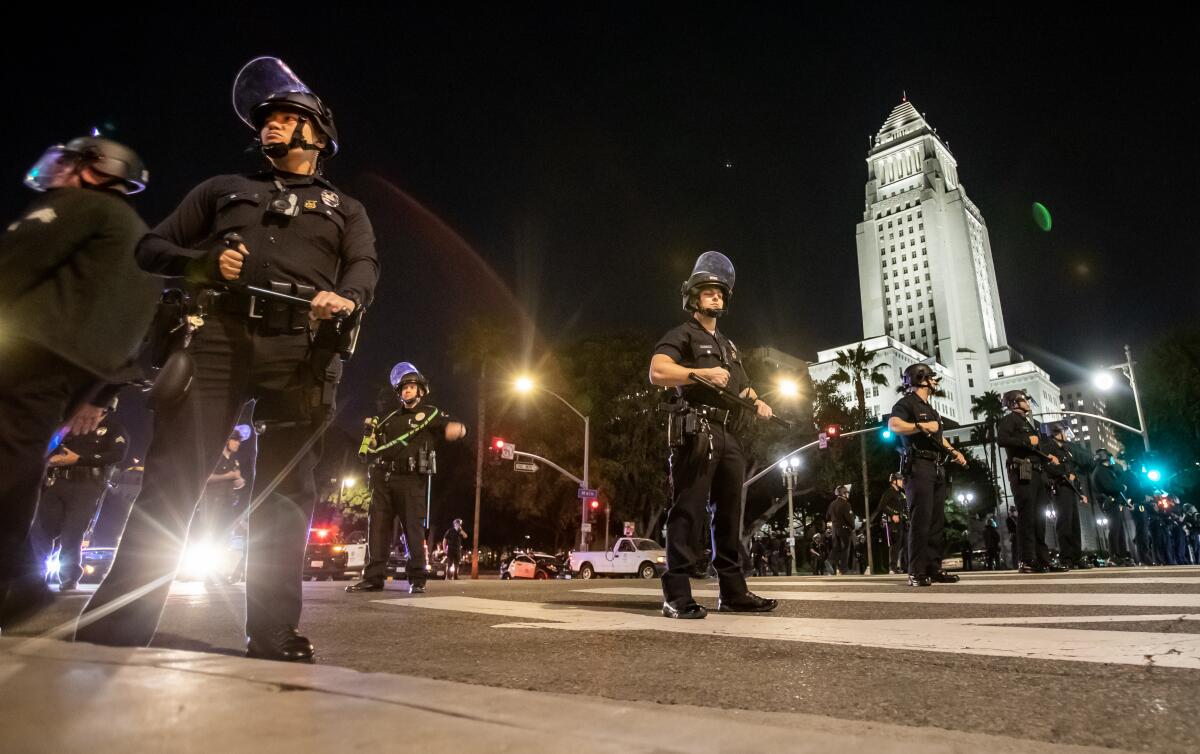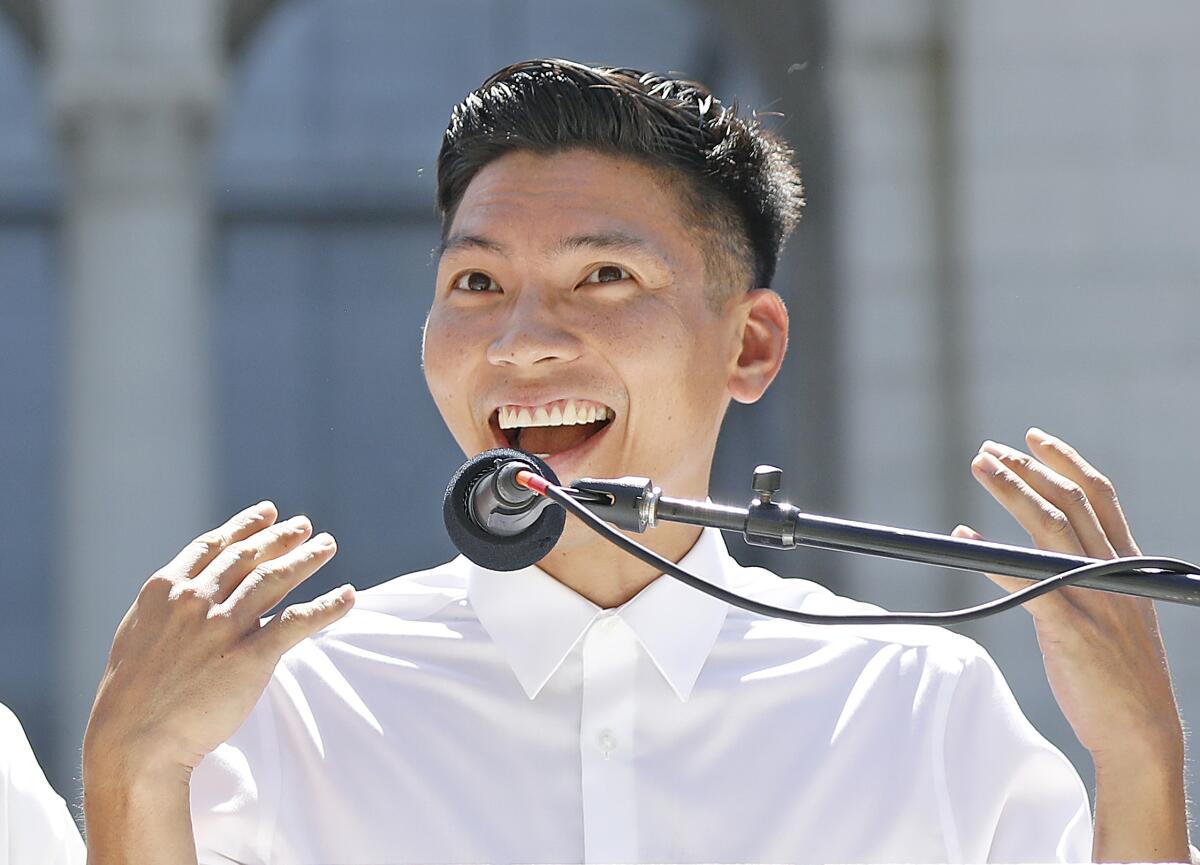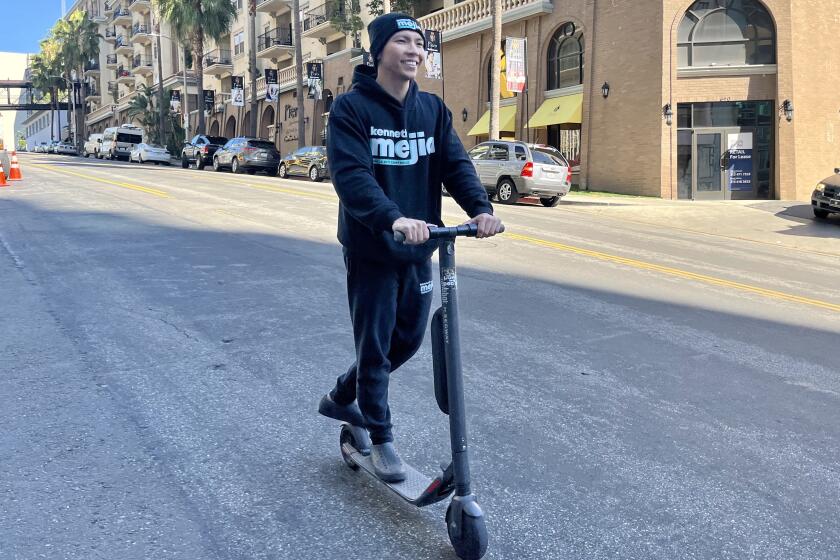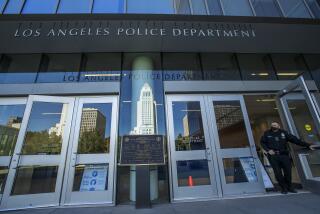L.A.’s new city controller is monitoring police. The LAPD union wants ground rules

When protesters took to the streets to speak out against police killings last month, Los Angeles City Controller Kenneth Mejia swung into action, sending members of his executive team to monitor the LAPD at back-to-back events.
High-level staffers in the controller’s office went to three consecutive days of protests in downtown, Hollywood and Venice, gathering “first-hand impressions of conditions on the ground” and seeking an understanding of “how our tax dollars are being spent,” according to Mejia and his media spokesperson.
Now, those activities are drawing criticism from the Police Department’s biggest union, which contends that Mejia’s monitors pose a safety risk by approaching officers at inappropriate moments. In a letter sent Friday, the Los Angeles Police Protective League, which represents more than 9,200 officers, asked City Atty. Hydee Feldstein Soto and LAPD Chief Michel Moore to set up a meeting with Mejia and the union to create protocols for interactions between his team and rank-and-file officers.
“Being questioned while performing their duties is not safe and puts our officers and the public at risk of injury or worse,” league President Craig Lally said in the letter.

Mejia did not respond to an interview request. But during an appearance on Twitch on Tuesday, he said his team behaved professionally when interacting with police and other city workers. At one demonstration, Mejia said, his team stayed “on the side and out of the way,” communicating with a lieutenant on the scene.
Asked about his bombastic tweets attacking President Biden and Hillary Clinton, City Controller-elect Kenneth Mejia said, “Definitely, I regret doing those things.”
“The lieutenant actually was there ... talking to us the whole time and talking mainly about what their operations were, what they were going to do next,” he said, adding, “It went pretty smooth.”
Feldstein Soto declined to set up a meeting, telling the league in a letter Monday that both the city controller’s office and the LAPD are her clients and that meetings with them would be subject to attorney-client privilege.
LAPD Capt. Kelly Muniz said the police chief will turn over information requested by the controller’s office, but has also asked Mejia not to interfere with the department’s day-to-day operations. She said she had not heard of any conflicts at protests.
Mejia has the right to question officers in the field, Muniz said, as long as he’s not impeding tactical operations.
“Have [the controller’s staff] been out, have they been talking to people? Yes. Is that the most efficient way to gather hard data? Maybe not. But we’re going to provide them information through proper channels,” she said.
Mejia took office in December, after campaigning on a promise to bring accountability to the LAPD. In the years leading up to his election, he was a frequent presence at demonstrations, showing up outside the Windsor Square home of then-Mayor Eric Garcetti, outside the San Fernando Valley home of Councilmember Paul Krekorian and inside the City Council chamber on days when protesters temporarily shut down meetings.
In recent weeks, Mejia’s office has requested information on the cost of sending police officers to protests. He and some of his top aides — chief of staff Jane Nguyen, chief of accountability and oversight Sergio Perez and spokesperson Diana Chang — have served as protest monitors.
On Jan. 27, Mejia, Nguyen and Perez went to a protest in the Civic Center, which took place on the night that officials in Memphis, Tenn., released graphic video of the police beating that killed 29-year-old Tyre Nichols. The demonstration in L.A. included some tense moments between protesters and police, with demonstrators pushing down barricades and spray-painting LAPD headquarters.
The following evening, three members of Mejia’s team went to a protest in Hollywood. Police later reported that they had arrested one protester on suspicion of smashing a storefront window and tagging a building.
The third night, Mejia, Nguyen and Chang went to Venice to a Black Lives Matter protest marking the death of Keenan Anderson, who died after being tased repeatedly by officers. During that demonstration, protesters left messages at the doorstep of City Councilmember Traci Park.
Mejia, on Twitter, said his team is not focused on the protesters’ behavior. “Our aim is to hold the City accountable (NOT to scrutinize the conduct of community members exercising their rights),” he wrote last month.
Get the lowdown on L.A. politics
Sign up for our L.A. City Hall newsletter to get weekly insights, scoops and analysis.
You may occasionally receive promotional content from the Los Angeles Times.
Paula Minor, a prominent organizer with Black Lives Matter-Los Angeles, said she hasn’t been to any of the protests where Mejia was present. But she spoke in favor of his push for LAPD oversight, saying it “cannot help but be beneficial.”
“If he’s out there, good,” she said, pointing out that the city has spent millions of dollars on legal payouts stemming from police misconduct at protests.
One lawsuit brought by Black Lives Matter organizers, which accuses the department of excessive force during George Floyd-related protests that swept the city in 2020, is still wending its way through the court system, Minor said.
Mejia’s staff members have gone to at least one of Mayor Karen Bass’ Inside Safe operations, at which outreach workers have moved homeless residents indoors. The controller also has approached officers inside City Hall, asking them on one occasion “what their duties are and why they’re there,” said LAPD Sgt. Dennis Clark, who is assigned to the building.
Mejia posed those questions on a day when a large number of protesters were at City Hall, Clark said.
More to Read
Sign up for Essential California
The most important California stories and recommendations in your inbox every morning.
You may occasionally receive promotional content from the Los Angeles Times.













